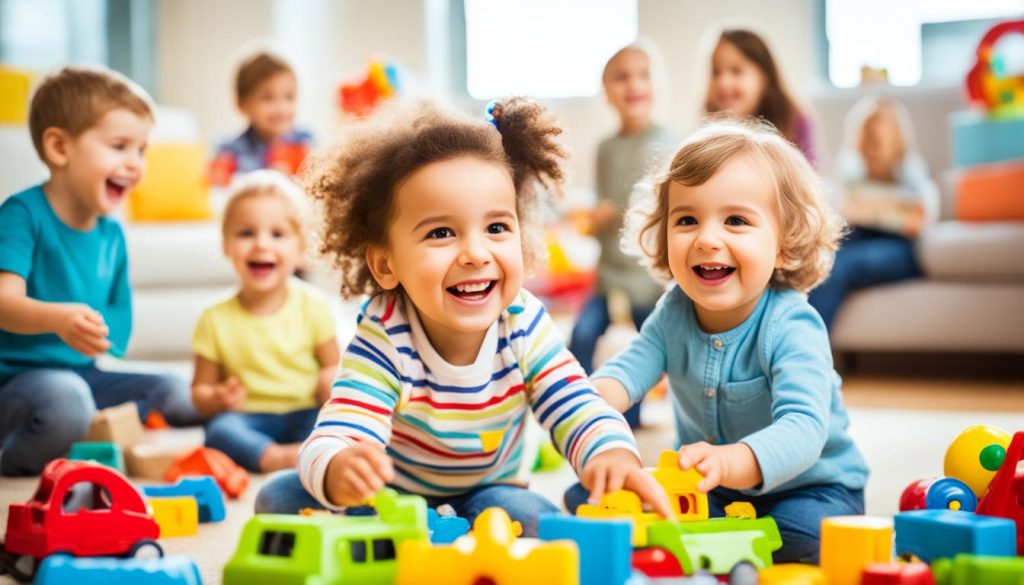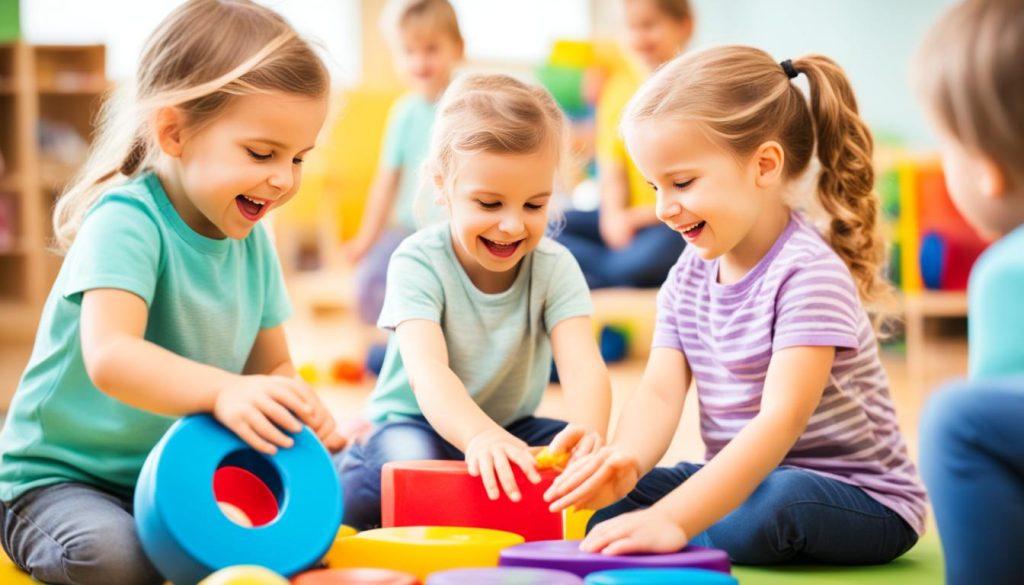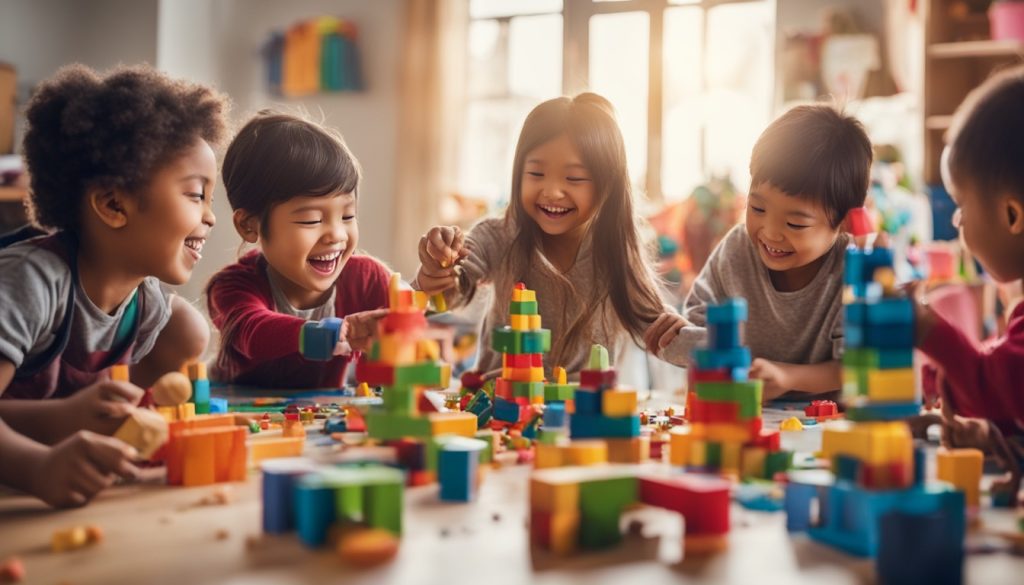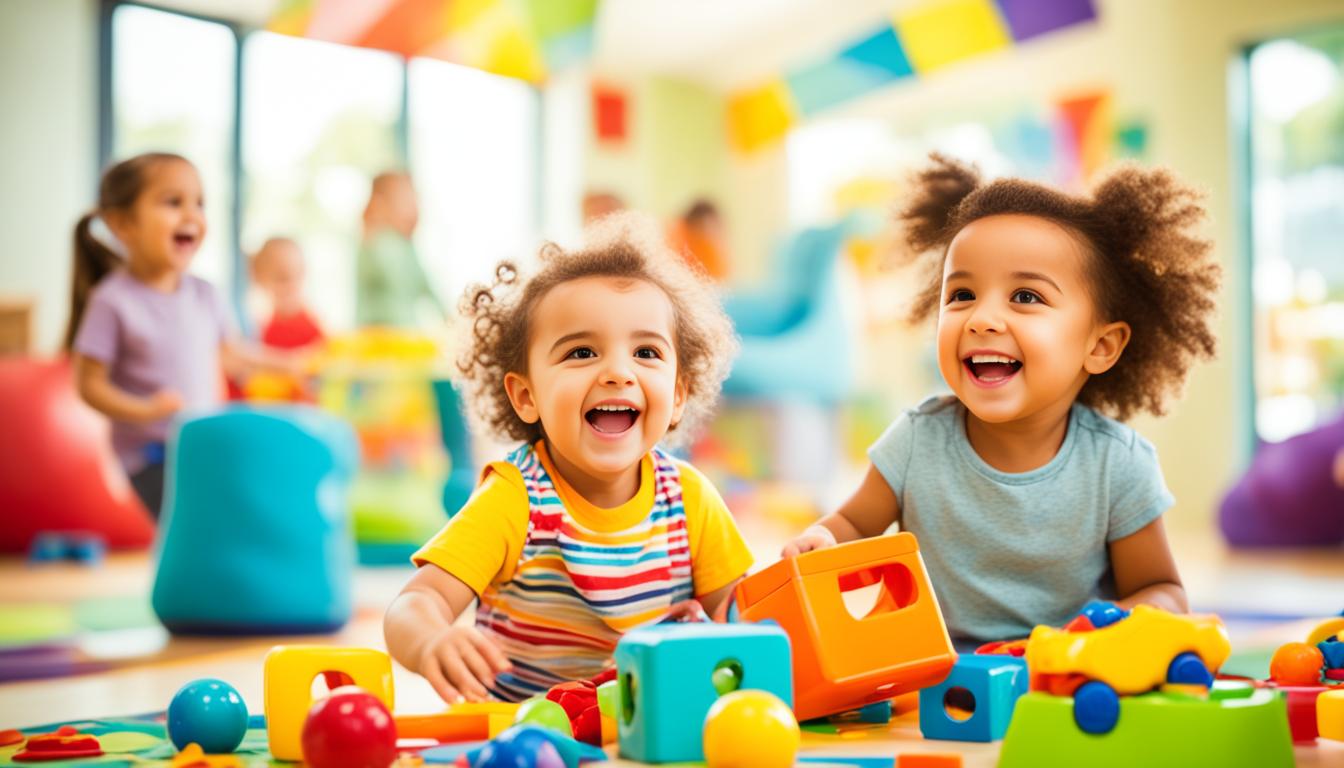Do you remember the excitement of meeting a new friend on the playground? Those moments were more than just fun; they were crucial for your growth. They shaped you into the person you are today. Playdates are key in early childhood, helping kids make friends and learn important social skills.
They also help parents connect and find support. Whether you’re a stay-at-home parent or a single parent, playdates create a caring community.
For kids, playdates are important for learning to communicate, share, and understand others. For parents, they’re a chance to swap parenting tips and share experiences. Playdates are where every laugh and game makes a big difference in your child’s life.
Key Takeaways
- Playdates are key for reaching important child development milestones.
- They boost communication, empathy, and social skills in kids.
- Parents gain from sharing positive parenting tips and support.
- Playdates fight isolation for kids and parents.
- They offer a break from screens, promoting real-life interaction.
The Importance of Socialization in Early Childhood
Socialization in early childhood is key to a child’s growth and happiness. It shapes who they become. Early learning programs are vital in teaching social skills. Kids learn a lot by watching and copying adults and friends, showing why positive parenting matters.

Benefits for Children
Being social helps kids feel good about themselves. Being part of groups lets them meet different people, boosting their confidence and understanding of others. This early learning in empathy can shape their adult life.
Socializing helps kids solve problems on their own. It also boosts skills like solving problems, being patient, and flexible. It prepares them for new situations, teaching them to share and think less about themselves.
Benefits for Parents
For parents, getting kids to socialize opens doors for talking and sharing parenting tips. It builds a network of support among parents. Playdates help parents meet others and feel part of a community. They also share ways to help their kids grow.
Combating Isolation
Regular social time is good for both kids and parents. It helps kids make friends and feel better emotionally. Safe places are key for kids to feel okay with being social. Seeing kids start to make friends is a big step in their social growth.
Parents get a break from feeling alone and find support in these moments. Playdates do more than just help kids get along. They improve talking skills, understanding others, and build a caring circle. Encouraging kids to be social is key to a strong, connected community for everyone.
| Aspect | Benefits for Children | Benefits for Parents |
|---|---|---|
| Socialization | Builds self-esteem, enhances problem-solving and empathy | Breaks social isolation, builds support networks |
| Playdates | Encourages independence, confidence, and social skills | Facilitates parent-child communication and parenting strategy sharing |
| Community Support | Fosters positive reinforcement parenting | Creates a supportive community, offers shared experiences |
Playdates and Social Skill Development
Playdates are key for your child’s social skills. They learn to communicate, empathize, and solve conflicts with peers. These activities help kids deal with sibling rivalry and teach them about sharing and fairness.
Communication Skills
At playdates, kids talk and play with others, boosting their communication skills. By age three, they start to share and take turns. This is important for them to express themselves and know how to communicate well.
Empathy and Understanding
Playdates help kids develop empathy and understanding. They meet different people and see things from their point of view. This helps build emotional smarts. Parents can help by teaching these values, making kids more confident and ready for social situations.

Negotiation and Conflict Resolution
Kids learn to negotiate and solve conflicts at playdates. They face disagreements and find ways to settle them peacefully. This helps them deal with sibling rivalry and prepares them for future relationships. By learning to compromise, they grow socially and emotionally.
| Age | Skill Development | Parental Role |
|---|---|---|
| 2 Years | Struggle with sharing due to limited emotional regulation | Model good sharing behavior |
| 3 Years | Understand turn-taking and sharing | Encourage sharing through praise |
| 5 Years | Recognize fairness and others’ feelings | Facilitate opportunities for social interaction |
Playdates are crucial for your child’s social growth. By joining in, your child learns how to handle social situations. These skills boost their emotional smarts and conflict-solving abilities. They prepare kids for life’s challenges and make their social life richer.
Playdates as a Break from Screen Time
Today, managing screen time is key for parents. Playdates help balance kids’ daily life and give them a break from screens. They learn social skills that help them grow and stay happy.

Playdates help kids make friends and learn healthy habits. They are key for a growth mindset and exploring hobbies offline. Kids get to play physically and creatively, which is good for them.
Think about the costs of playdates. They can cost $12 to $24 per session, covering snacks and cleaning. Over a year, weekly playdates could be over $1080. Sharing resources with other parents teaches kids about giving and working together.
Playdates are vital for kids’ social, emotional, and academic growth. They learn to talk, negotiate, and solve problems. They also see different views in a safe place. Switching playdates with other parents builds a strong community focused on safety and growth.
So, playdates are more than screen breaks. They help kids grow fully. By mixing hobbies into playdates, kids have a rich, balanced childhood without too much screen time.
Creative Play and Imagination
Playing creatively is key to boosting a child’s creativity and imagination. It lets kids try out different roles and scenarios. This is great for their thinking and social skills.

Types of Imaginative Play
There are many ways kids can play imaginatively during playdates. Each type has its own benefits for their growth. Here are a few:
- Pretend Play: Kids start pretending around 15-18 months. They might dress up or pretend to cook. This helps them understand the difference between real and pretend.
- Role-Playing with Toys: Using toys like stuffed animals or puppets helps kids with social and talking skills.
- Art Activities: Doing art like painting or drawing helps with fine motor skills and hand-eye coordination.
- Outdoor Adventures: Being outside can spark creativity. Kids can play with sand, water, or go for nature walks.
Encouraging Creativity
It’s important to encourage creativity in kids. Here are some ways to do it:
- Limit Screen Time: Kids under 2 should avoid screens except for video chats with people they know. Older kids should have limited screen time to keep their imagination alive.
- Unstructured Play: Giving kids free time lets them use their imagination and create. It helps them be more creative.
- Verbal Activities: Doing rhymes, riddles, and phonics can spark creativity in kids.
- Special Play Spaces: Simple things like draping cloth over chairs can turn into stories and games for kids.
These methods support imaginative play and bring many benefits to kids. They help with creativity and overall growth. Susan Engel, Ph.D., says early childhood is the best time to help kids develop their imaginations. This sets them up for solving problems creatively later on.
Preparing for Kindergarten through Playdates
Playdates are great for getting kids ready for kindergarten. They offer a chance for kids to become more independent and learn responsibility. Through play, kids learn important skills that help them in school.
Building Independence
Getting kids ready for kindergarten means teaching them to be independent. Day camps at local parks are perfect for this. Kids learn how to work with others and feel confident.
They practice simple tasks like tying their shoes and using the bathroom on their own. These skills boost their confidence and help them adjust to school.
Encourage your child to do simple tasks alone every day. This helps them feel less anxious when they start school. Giving them chances to practice at home and during playdates helps them become more independent.
Teaching Responsibility
Teaching kids about responsibility is key for kindergarten. At playdates, kids learn to follow rules and take care of their things. They help clean up after play or set up for crafts.
This teaches them the value of helping out and being part of a team. Praising their efforts shows them how important it is to be responsible. Doing these activities regularly makes them more ready for school.
It’s also vital to consider how kids feel. Hugs and cuddles release oxytocin, which is good for their well-being. This article on the importance of physical touch explains how touch helps kids grow.
| Activity | Skills Developed |
|---|---|
| Counting Games | Number Recognition |
| Reading Together | Language Skills |
| Craft Projects | Fine Motor Skills |
| Outdoor Play | Gross Motor Skills |
| Role-Playing | Social and Emotional Skills |
The Role of Playdates in Parenting and Raising Kids
Playdates are more than fun outings for kids; they’re key for parents too. They let parents share their experiences and advice, creating a strong support network. Talking during playdates can give new ideas and help parents and kids bond better.
Sharing Parenting Strategies
Playdates have changed over time. Now, parents plan and watch over their kids’ playtime. This setup is perfect for swapping parenting tips. You can discover different ways to raise kids and pick up useful advice for your family.
Talking about parenting methods also strengthens the bond between parents and kids. It’s through shared activities and hobbies that this happens.
Building a Support Network
Playdates are great for making a parenting support network. This network offers emotional and practical help. It also reduces the stress of trying to prepare kids for everything.
Parents at playdates work together to help their kids grow well. They build teamwork, resilience, and confidence in their children.
Studies show that quality family time is more important than too many playdates and activities. It’s what makes lasting memories and a strong family bond.
| Advantages for Parents | Advantages for Kids |
|---|---|
| Exchanging strategies | Strengthened relationships |
| Building a support network | Diverse skill development |
| Alleviating pressures | Improved communication |
| Strengthening parental bonds | Enhanced social skills |
Being part of playdates with other parents creates a caring community. It’s key for good parenting and raising kids well.
Managing Playdates: Setting Boundaries and Expectations
Setting clear boundaries and expectations is key for fun and safe playdates. It helps create a safe space and teaches kids good manners. It’s a chance to use effective discipline strategies that shape their social skills now and later.
When planning playdates, think about the kids’ ages and where they are in their development. Here’s a guide on what to consider for different age groups:
| Age Group | Recommended Duration | Parental Presence | Special Considerations |
|---|---|---|---|
| Infant to Age 2 | 1-2 hours | Parents should stay | Focus on parental socialization |
| Preschool (Ages 3-6) | 2-3 hours | Parents usually stay | May need downtime; consider potty-training |
| Elementary School (Ages 7-12) | Varies, including sleepovers | Clarify in advance | Consider individual comfort levels |
| Middle and High School (Ages 12+) | Flexible | Not usually required to stay | Establish curfews and check-ins |
Talking about the rules with your child before playdates is crucial. It helps them know what’s expected and improves their ability to follow rules. Using effective discipline strategies is also important for handling conflicts or issues. Teaching kids good manners during these times helps them grow and prepares them for bigger social situations.
Activities to Foster Social Skills During Playdates
Playing with your child is a great way to help them learn social skills. There are many fun activities that can teach teamwork, cooperation, and patience. These skills are key for your child’s social growth.
Turn-Taking Games
Games like “Duck, Duck, Goose” and “Candy Land” are perfect for teaching kids about taking turns. They learn to wait and respect others’ time. These games also boost patience and communication skills.
They make playing fair and understanding others easier. Research from 2010 by Kirschner and Tomasello shows that doing things together, like making music, helps kids get better at social skills.
Group Crafts
Working on crafts together is a great way to teach kids about teamwork. Projects like a big collage or a community garden teach them to work together. They learn to share and work towards a common goal.
Studies say that gardening is a great way to learn social skills. It helps kids become more responsible and socially skilled.
Outdoor Activities
Being outside is good for kids in many ways. It lets them play team sports, go on scavenger hunts, and more. These activities teach them about teamwork and how to handle different game outcomes.
Scavenger hunts are great for learning to work together, organize, and make decisions. They help kids develop important skills.
| Activity | Skills Developed | Examples |
|---|---|---|
| Turn-Taking Games | Patience, Communication | Duck, Duck, Goose; Candy Land |
| Group Crafts | Cooperation, Creativity | Giant Collage; Community Garden |
| Outdoor Activities | Teamwork, Decision-Making | Scavenger Hunts; Team Sports |
Conclusion
Playdates are key for kids’ social growth. They help kids learn social skills, cut down on screen time, and boost creativity. By setting up playdates, you help your kids get better at talking, feeling for others, and solving problems. These activities are vital in today’s world, where kids often spend too much time in front of screens.
Playdates also help make kids kinder. When kids play together, they learn to work as a team, share, and see the importance of being kind and a good friend. These early play times lay the groundwork for learning throughout their lives. They help kids become more independent and ready for school and social life. Playdates also teach kids how to handle tough times, which is key for their emotional health.
For parents, playdates are more than just fun for kids. They’re a chance to meet other parents and share tips on parenting. This is especially true for parents who want their kids to be independent and do well in school. As more parents move away from strict parenting, playdates become a key way to help kids grow up emotionally smart and balanced.
In short, adding playdates to your parenting plan is a smart move. They help reduce screen time, support emotional and social growth, and create a caring space for everyone. See playdates as a way to help your kids thrive in today’s digital world, teach them to be kind, and keep them learning for life.
FAQ
What role do playdates play in child development milestones?
How does positive parenting relate to playdates?
How can playdates support a child’s mental health?
Why is socialization in early childhood important?
What are the benefits of playdates for parents?
How do playdates help in combating isolation for parents and children?
How do playdates enhance a child’s communication skills?
How do playdates foster empathy and understanding in children?
How do playdates help in negotiation and conflict resolution?
Why are playdates beneficial as a break from screen time?
What types of imaginative play occur during playdates?
How do playdates encourage creativity in children?
How do playdates help prepare children for kindergarten?
How can playdates help in building a support network for parents?
How do you set boundaries and expectations during playdates?
What activities can foster social skills during playdates?
This post contains affiliate links. If you click on a link and make a purchase, I may earn a small commission — at no extra cost to you. Thank you for supporting this blog and helping me keep the patterns free! Read the full Affiliate Disclosure & Transparency.
